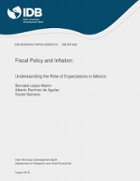Fiscal Policy and Inflation: Understanding the Role of Expectations in Mexico
Date
Aug 2018
We exploit a hidden Markov model where inflation is determined by government deficits financed through money creation and/or by destabilizing expectations dynamics (expectations can potentially divorce inflation from fundamentals). The baseline model, proposed by Sargent et al. (2009), is used to analyze the interaction between fiscal deficits, inflation expectations, and inflation in Mexico. The model is able to distinguish between causes and remedies of hyperinflation, such as persistent or transitory shocks to seigniorage-financed fiscal deficits, deanchoring of inflation expectations from fiscal fundamentals, and cosmetic (non-fundamental) monetary reforms. The behavior of monetized deficits provides an adequate account of high inflation episodes and stabilizations for the period 1969-1994. We then extend the model to analyze the possibility that fiscal policy can affect inflation expectations in a context of Central Bank independence, as is the case in Mexico after 1994. We find evidence that the exchange rate and sovereign interest rate spreads influence the evolution of aggregate prices.



